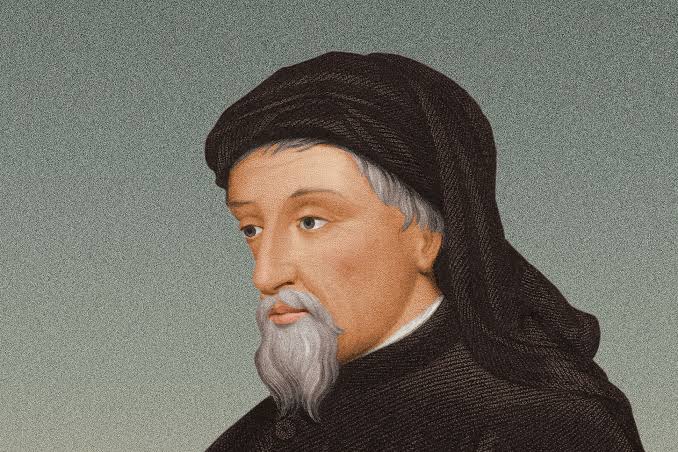The Canterbury Tales; THE MILLERES TALE
PROLOGUE TO THE MILLERES TALE
Heere folwen the wordes bitwene the Hoost and the Millere
Whan that the Knyght had thus his tale ytoold,
In al the route ne was ther yong ne oold
That he ne seyde it was a noble storie,
And worthy for to drawen to memorie;
And namely the gentils everichon.
Oure Hooste lough, and swoor, "So moot I gon,
This gooth aright, unbokeled is the male,
Lat se now who shal telle another tale,
For trewely the game is wel bigonne.
Now telleth on, sir Monk, if that ye konne
Somwhat to quite with the Knyghtes tale."
The Miller that for-dronken was al pale,
So that unnethe upon his hors he sat,
He nolde avalen neither hood ne hat,
Ne abyde no man for his curteisie,
But in Pilates voys he gan to crie,
And swoor by armes and by blood and bones,
"I kan a noble tale for the nones,
With which I wol now quite the Knyghtes tale."
Oure Hooste saugh that he was dronke of ale,
And seyde, "Abyd, Robyn, my leeve brother,
Som bettre man shal telle us first another,
Abyd, and lat us werken thriftily."
"By Goddes soule," quod he, "that wol nat I,
For I wol speke, or elles go my wey."
Oure Hoost answerde, "Tel on, a devele wey!
Thou art a fool, thy wit is overcome!
"Now herkneth," quod the Miller, "alle and some,
But first I make a protestacioun
That I am dronke, I knowe it by my soun;
And therfore, if that I mysspeke or seye,
Wyte it the ale of Southwerk I you preye.
For I wol telle a legende and a lyf
Bothe of a carpenter and of his wyf,
How that a clerk hath set the wrightes cappe."
The Rev answerde and seyde, "Stynt thy clappe,
Lat be thy lewed dronken harlotrye,
It is a synne and eek a greet folye
To apeyren any man or hym defame,
And eek to bryngen wyves in swich fame;
Thou mayst ynogh of othere thynges seyn."
This dronke Miller spak ful soone ageyn,
And seyde, "Leve brother Osewold,
Who hath no wyf, he is no cokewold.
But I sey nat therfore that thou art oon,
Ther been ful goode wyves many oon,
And evere a thousand goode ayeyns oon badde;
That knowestow wel thyself, but if thou madde.
Why artow angry with my tale now?
I have a wyf, pardee, as wel as thow,
Yet nolde I for the oxen in my plogh
Take upon me moore than ynogh,
As demen of myself that I were oon;
I wol bileve wel, that I am noon.
An housbonde shal nat been inquisityf
Of Goddes pryvetee, nor of his wyf.
So he may fynde Goddes foysoun there,
Of the remenant nedeth nat enquere."
What sholde I moore seyn, but this Miller
He nolde his wordes for no man forbere,
But tolde his cherles tale in his manere;
Me thynketh that I shal reherce it heere.
And therfore every gentil wight I preye,
For Goddes love, demeth nat that I seye
Of yvel entente, but that I moot reherce
Hir tales alle, be they bettre or werse,
Or elles falsen som of my mateere.
And therfore who-so list it nat yheere,
Turne over the leef, and chese another tale;
For he shal fynde ynowe, grete and smale,
Of storial thyng that toucheth gentillesse,
And eek moralitee, and hoolynesse.
Blameth nat me if that ye chese amys;
The Miller is a cherl, ye knowe wel this,
So was the Reve, and othere manye mo,
And harlotrie they tolden bothe two.
Avyseth yow, and put me out of blame,
And eek men shal nat maken ernest of game.
THE TALE
(One John, a rich and credulous carpenter of Oxford, is
beguiled by his wife Alison, through Nicholas, a poor
scholar boarding with them. Absolon, the parish clerk, is
slighted by Alison; but wreaks vengeance on Nicholas.)
